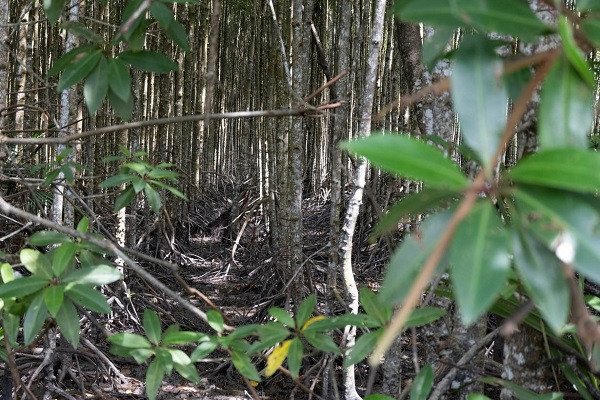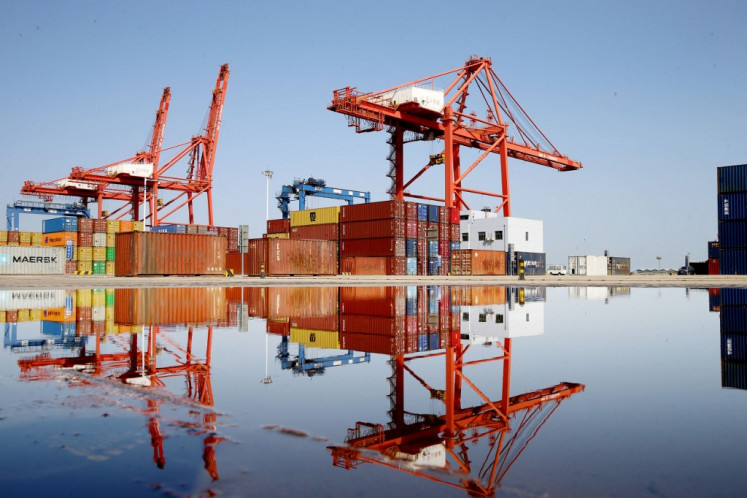Indonesia must push for fairer carbon market, activists say
Activists warn that companies will misuse the carbon market to avoid reducing their greenhouse gas emissions.
Change text size
Gift Premium Articles
to Anyone

C
limate activists have urged Indonesia to play a stronger role in ensuring the global carbon market will not undermine the real greenhouse gas emissions reduction efforts ahead of the upcoming United Nations Climate Change Conference, or COP28, later this year.
The United Arab Emirates will host the 28th UN climate summit in Dubai from Nov. 30 to Dec. 12 this year. The conference’s main focus will be fast-tracking the energy transition, climate financing and adaptation to the impacts of the climate crisis, said Sultan Ahmed Al Jaber, the CEO of the Abu Dhabi National Oil Company and president-designate for COP28, in a statement last Thursday.
The summit was expected to work out the details of the international carbon market mechanism as well as the loss and damage funding mechanism.
Indonesia has keenly anticipated the carbon market, marked by the issuance of a presidential regulation on carbon’s economic value in 2021, days before the COP26.
Last month, the Environment and Forestry Ministry also issued a ministerial regulation detailing the mechanism of carbon trading in the forestry sector. The ministry also penned on Tuesday a memorandum of understanding with the Financial Services Authority (OJK) to further prepare the carbon market.
Red flags
Indonesia needs to be cautious in creating a carbon market so that it does not become a greenwashing tool used by companies to avoid reducing their emissions, warns Greenpeace Indonesia country director Leonard Simanjuntak.
One carbon market mechanism allows companies to compensate for their emissions by purchasing carbon credits from other companies that are working on emission mitigating or removal projects, such as forest conservation. But critics slammed this mechanism, saying that it is unjust because companies can buy as much carbon credit as they want without reducing their emissions.
“We need strong monitoring mechanisms to make sure that the incentives to reduce emissions will actually be bigger than the carbon credit trading,” said Leonard.
Ahead of the climate summit in Dubai, Leonard also urged Indonesia to support those who are most vulnerable to the impacts of the climate crisis, such as the small archipelagic countries in the Pacific. These countries are facing similar challenges to Indonesia, such as sea level rise, which threatens coastal areas.
Climate activists also raise concerns over the oil-focused UAE, especially after Al Jaber wrote in his statement that he urged the world to “accelerate the inevitable and essential phasedown of fossil fuels.” Experts have been pushing for the phaseout of fossil fuels in order to limit the average global temperature rise to 1.5 degrees Celsius, which is necessary to prevent the worst possible outcome of the climate crisis.
The prospect of negotiations on loss and damage funding may also be in a precarious situation, said Nadia Hadad, the executive director of Madani Foundation environmental group, due to reluctance from some powerful countries to contribute to the fund.
The United States, for example, will not pay reparations to developing countries hit by climate-fueled disasters, the country’s special envoy on climate change John Kerry said during a congressional hearing last week, Reuters reported.
Nadia called on Indonesia to play a strong role in this year’s climate summit by making sure that developed countries would commit to phasing out fossil fuels and providing funds to help recover from the damage incurred by climate disasters.
“We have bargaining power to do so as a country with the third-largest area of tropical forests, which are one of the world’s most important carbon sinks,” Nadia said. Carbon sink refers to anything, natural or artificial, that absorbs and stores more carbon from the atmosphere than it releases.
Climate diplomacy
The issues of the energy transition and carbon trading will likely be at the forefront of the agendas of Indonesian delegations at the upcoming COP28, said Agus Justianto, the director general of sustainable forest management at the Environment and Forestry Ministry.
“We hope that there will be a deal on [carbon trading] so the international carbon market will finally have clear regulations,” Agus said on the sidelines of a public introduction event for the Indonesia Pavilion for COP28 in Jakarta on Tuesday.
The pavilion will serve as a soft diplomacy tool, away from the negotiating table, to show the world the concrete steps Indonesia has taken to tackle climate change, said Agus, who was tasked to lead the preparation for the pavilion.
The Indonesian delegation will host talk shows and presentations in the pavilion during the climate summit in Dubai.









